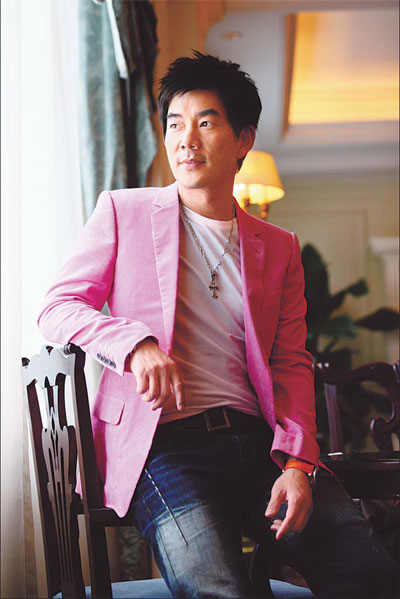Culture
Rebellious Taiwan star shows ocean of creativity
By Xu Fan (China Daily)
Updated: 2010-07-08 09:38
 |
Large Medium Small |
|
 Richie Ren says his new album chronicles his life experience. [Zou Hong / China Daily] |
Pop star Richie Ren used to scuffle with classmates, put his hair in weird plaits and skip school just to be rebellious when he was a teenager.
Standing by the windows of a luxury hotel in Chaoyang district, Ren, who had just spent more than 10 hours flying from Hong Kong to Beijing due to weather-related delays, posed professionally for a dozen photographs, though his big smile wasn't enough to mask his fatigue.
"Celebrities always create a storm when out in public," said Ren, quoting an old Chinese saying in a self-mocking tone.
Ren, who was raised in a small village in Taiwan, became an overnight sensation for the love song Too Soft-hearted (Xin Tai Ruan), which topped the charts on the Chinese mainland in 1996 and is widely known for his good temper and humor.
But the 45-year-old star said things were different when he was in high school.
"At that time, I was bad tempered and was frequently criticized or punished. My father was often angry with me," he said, adding now that he is also a father he is starting to understand how frustrated his own father must have been.
"I'm learning how difficult it is to be a parent," he said.
Aside from being a best-selling singer (he sold a record 1.32 million copies of his album Love is Like the Pacific Ocean) Ren has appeared in many television shows.
He came to Beijing promoting his new album, Music Traveler, which contains 15 of his own songs.
"Life is a long journey with different stops along the way. Someone accompanies you for one section of the journey and then says goodbye and leaves," he said. "Every section has something that inspires me."
Among the 15 songs, Ren said his favorite is Song for Senior Cheung, which tells the story of a lonely old man trembling while working in cold weather in a strange, far-off place, while longing for his bride, who he left behind in their hometown decades ago.
"I wrote the song for my father and other veterans of his generation," said Ren. Ren's father was a Kuomintang soldier and left his hometown for Taiwan after 1949.
"Ren is not easy to pronounce or to work into lyrics, so I had to use a comparatively easier name for the old man in the song," he said.
Ren said he used Cheung because of a passing conversation with Hong Kong actor Dicky Cheung, in which they talked about a hard working old man they saw riding through the streets one morning, and also because Cheung is a common name in Taiwan.
In addition to sentimental songs, Ren said he also included some happy songs such as Grandmother's Bridge, a folk ballad originally created to help put his daughter to have a good sleep.
Q & A
Q: The promotional material says your new album is "do it yourself", what exactly does that mean?
A: Fans incorporate their own photos in the album's illustrations. One of the illustrations, for example, shows me staring at a huge poster. If a fan sends in photos of himself or herself we can send that fan an album with me looking at a poster of him or her.
Q: Is the "do it yourself" album sold as a limited edition?
A: No, everyone who wants one can buy it from my company's website.
Q: Critics say the recording industry is in a slump. What do you think?
A: It is likely true. We used to be able to fly to places such as the United States all the time and enjoyed the same treatment as Michael Jackson. Things are a bit different now. But I'm still able to create music, which is my dream.
Q: What's your impression of Beijing?
A: Beijing is the first city I became familiar with on the Chinese mainland. I stayed in Beijing for three to four months in the 1990s, when the city hadn't developed outside the Third Ring Road. It's amazing that the city has expanded so much in one decade. Beijing is more like a construction museum these days, as many world-famous architects get to design oddly shaped buildings here.
Q: Many stars from Taiwan buy property in Beijing as an investment - will you?
A: Not yet. My career means I'm constantly on the go, flying from one city to another. It makes no sense to buy property in a place if I don't spend much time there. My main job is performing and singing. I don't want to earn money by investing in real estate.
| 分享按钮 |